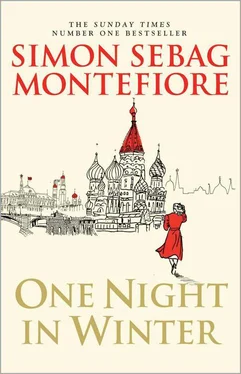‘Or dancing?’ suggested Nikita Khrushchev. Satinov observed this squat confection, the warts on his face, teeth like a horse, his suit as baggy as a sack. He was a real peasant. ‘Isn’t Comrade Satinov an expert at the lezginka ?’
Stalin swivelled towards him. ‘I thought you were the great dancer, Nikita.’
‘Me? I can hardly take two steps.’
‘I think we need to see you dance, don’t we, comrades?’ suggested Stalin, eyes glinting.
‘I’ve heard that Khrushchev is the best dancer we have!’ cried Beria.
‘The very best!’ added Malenkov.
Zhdanov hiccuped. He was deathly white. He never joined in such horseplay. He was a serious man.
‘Show us,’ ordered Stalin.
‘I can’t… I mustn’t… Not after such a banquet!’ said Khrushchev anxiously.
‘I think you’ll survive,’ laughed Stalin. ‘Comrades, let’s vote on it. Who wishes to see if Comrade Khrushchev can dance the gopak ?’
Satinov raised his hand. Beria, Poskrebyshev, Zhdanov, Molotov copied him.
‘Unanimous!’ declared Stalin.
‘Dance!’ shouted Beria, who’d already begun to clap.
‘It’s a Politburo order!’ teased Stalin.
The others – everyone except Stalin – also clapped in time, chanting: ‘Khrushchev dance! Khrushchev dance!’
Khrushchev looked at Stalin, who shrugged apologetically and opened his hands. Khrushchev got to his feet and, raising his hands and bending his knees, started to dance the gopak .
‘You’re like a cow on ice!’ Stalin tapped out the tune. ‘No sense of rhythm at all, Nikita. Sit down now!’
Khrushchev slumped panting into his seat.
Beria, who was serving as the tamada , the toastmaster at a Georgian feast, raised a series of toasts to dancers male and female – especially female.
Stalin was focusing on Zhdanov. ‘You’re sitting there very virtuously like Christ himself but you didn’t drink much.’
‘He should drink a forfeit shot,’ said Beria. Satinov knew Beria hated Zhdanov, Stalin’s companion in intellectual matters. Stalin’s choice as successor.
Streams of sweat ran down Zhdanov’s face, and Satinov could see he was ill. ‘The Kremlevka says I have to refrain. It’s my heart,’ he explained.
‘The Kremlevka? The lady doctor there?’ asked Stalin.
‘Dr Dashka Dorova.’
‘Taking orders from women eh? Well, you obey your lady doctor,’ said Stalin with a grin. ‘Women with ideas are like herrings!’ He hated independent women.
‘Comrade Poskrebyshev also didn’t drink that last toast properly,’ sneaked Beria.
‘Is that true, Sasha?’ asked Stalin.
‘I did. Didn’t you see?’
‘The rules are that Comrade Poskrebyshev must drink a forfeit: three shots in one!’ said Beria.
Stalin raised his eyebrows, smiling. Beria filled a tumbler with vodka and Malenkov, his sidekick, delivered it to Poskrebyshev, who stood up. Taking a breath, he downed it: gulp gulp gulp. Flushed, he tottered. A hiccup convulsed his body, and he ran for the French windows, threw them open and vomited into the fish pond outside. Beria started to chortle.
‘Sasha’s got the hardest head I ever knew,’ said Stalin, trying not to laugh. But then his expression suddenly changed. ‘I think you’re overdoing it, Beria. Stop bullying people at my table. I don’t like it. You’re lowering the tone here!’
‘You’re right,’ said Beria. ‘I apologize.’
‘Go and check he’s all right.’
Beria pulled himself up and followed Poskrebyshev outside into the grey light.
‘I think it’s bedtime.’ Stalin stood up, slightly unsteady on his feet. Leaning on the doorframe, he went out on to the porch at the front. Guards in white suits stood like statues in the illuminated gardens. The sun was rising over Moscow.
The leaders staggered on to the porch, stiff-legged, bleary-eyed and as pale as a plate of kasha . Satinov thought he had never seen an unhealthier gaggle of middle-aged men outside a hospital ward.
He looked back and saw Beria trying to heave Poskrebyshev down the corridor from the dining room. ‘Bring the bodies out!’ Stalin shouted.
Together they dragged Poskrebyshev outside, past Stalin, down the steps and pushed him into the back of his car.
As they did so, Beria took Satinov’s hand, squeezed it tightly and whispered so close to his ear that he wet it with his saliva: ‘George is fine. The children are coming home.’
‘What are you saying?’ called out Stalin.
‘I’m telling him that Poskrebyshev’s going to vomit again,’ said Beria.
‘Pah!’ said Stalin hoarsely.
Satinov felt weak with relief. The Organs had investigated the shooting, and that was that. He would not reprimand George again, he decided. The boy had been punished enough.
The road was a deep mauve, the sky, lilac with shards of pink: a perfect Russian summer dawn. The sweet scent of flowers and resin emanated from the woods. A peacock in Stalin’s garden trilled a high-pitched leee-at! Leee-at! A nightingale cooed its last notes.
Stalin picked a rose, smelled it with his eyes closed and handed it to Satinov. ‘For Tamriko,’ he said.
Satinov understood. It was for George.
AT SEVEN TWENTY that morning, Dr Rimm, the Deputy Director of School 801, nicknamed the Hummer by the children, was waiting in the janitor’s storeroom. He felt in his waters that he was about to receive a revelation. There had been no love letters from the enigmatic ‘Tatiana’ for a while, not since the shooting. But he wasn’t thinking of this. He was thinking of the note that he’d been sent two days earlier.
He had been in his classroom preparing for Communist ethics when he’d noticed the envelope peeping out of his copy of the History of the Communist Party of the Soviet Union (Bolsheviks): Short Course. When he saw it, his heart had leaped: was it another love letter? Those letters had kept him alive for the last term. Rimm was long divorced from a Communist Party instructor whom he’d met on a Pioneers camping trip to the Crimea – and he had not had a girlfriend since. But surely he deserved happiness like anyone else? (Why did women so adore Benya Golden? What did that effete, skirt-chasing smooth-talker have that Rimm didn’t? Didn’t they know he was tainted?) The feeling that someone – he was sure he knew who it was – loved him had restored his battered pride. He knew their passion was impossible, at least for now, but this aura of love gave him confidence in his ambitions.
The envelope had been addressed in a childish hand. ‘Tatiana’s’ love letters were always typed in capitals. But the disappointment had passed swiftly. The school was on the rack: two children dead, more arrested, all of them the scions of Bolshevik grandees. Out of the tragedy, he was convinced, the rottenness of Director Medvedeva’s headship would be exposed. She had made mistakes, allowing bacterial heresies to spread through the school. He had warned her about the peril of employing Golden as a teacher and allowing the Fatal Romantics’ faction to indulge in bourgeois romanticism. And he had been proven right in the most terrible way possible. Only he could cleanse the school of her un-Bolshevik, unpatriotic mistakes. He opened the note. I need to speak to a person in authority. May we meet by the janitor’s storeroom 7.30 a.m.? A young comrade.
‘Tra-la-la Stalin…’ he burst out singing his favourite song. He had known instantly with a surge of sap in his gut that this note heralded his moment.
So now he was waiting there. He had woken at 4 a.m., heart palpitating, walked around Moscow since dawn, taken a coffee at the Moskva Hotel, just to celebrate. He had not served in the war (too old, and the problems with his hips) but he longed to be a spy or a leader. He knew people in the Organs and they appreciated him. And now, he was the only honest and vigilant Communist at the school, ready to do his duty. What time was it now? Seven forty and no one had come. Inside the storeroom, he began to hum.
Читать дальше












